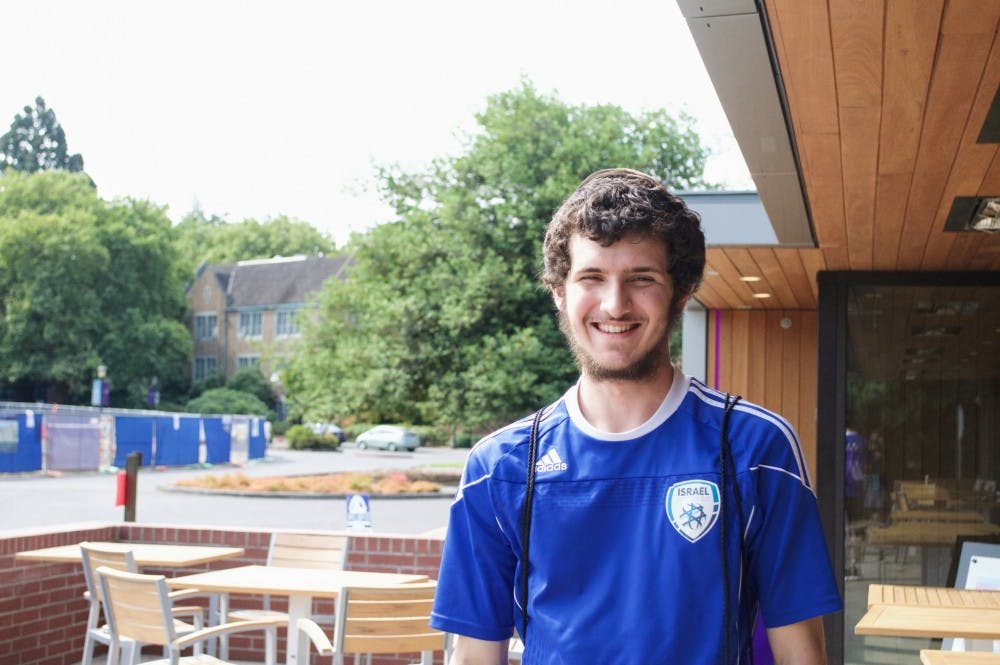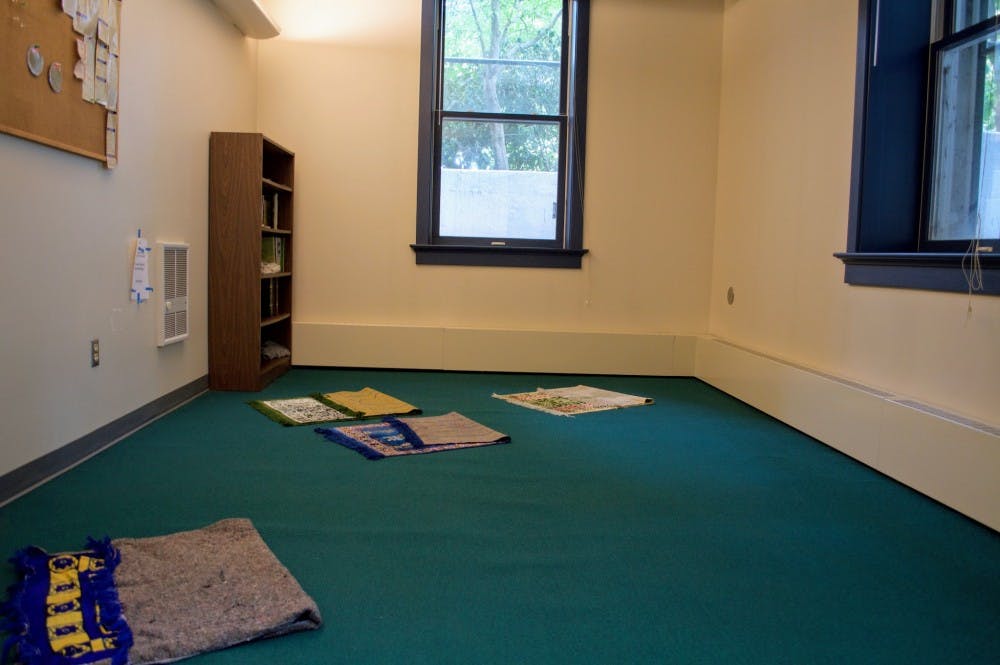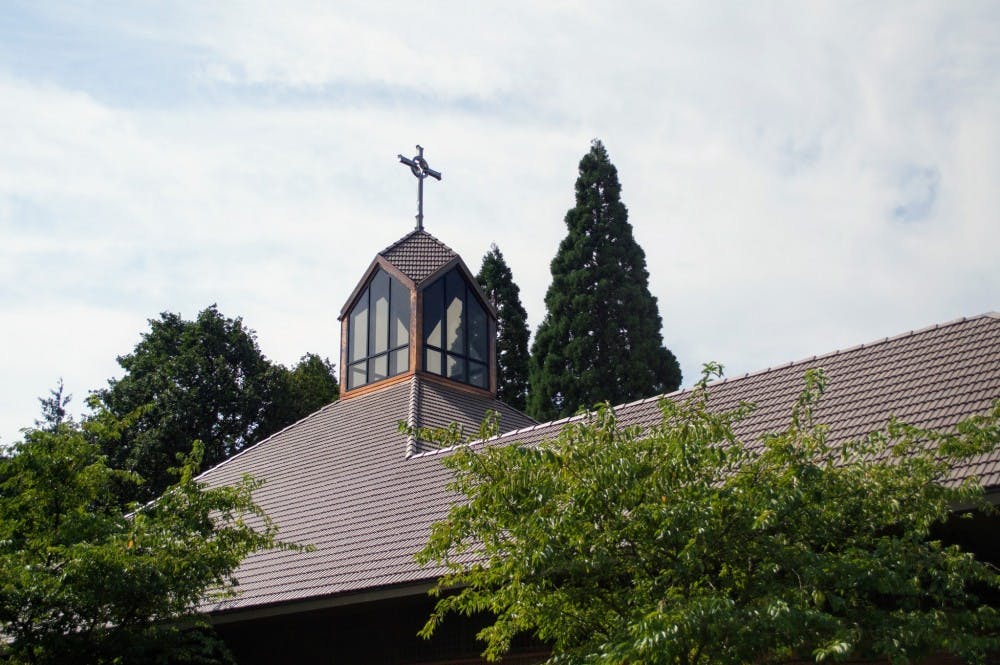Freshman biology major Ryan Dexheimer first realized that he wanted to come to the University of Portland during a tour with his parents at “Weekend on the Bluff” last April. He was astounded by the beauty of the campus. However, the presence of a crucifix in every classroom caused him discomfort.
“My dad turned to me and asked me ‘are you going to be okay with this?’” Dexheimer said. “But I realized I’m going to be Jewish no matter what. That’s not going to change.”
He committed to UP and paid his tuition deposit that weekend.
Dexheimer, a Portland native and a practicing Jew, is still getting used to the university and its traditions.
“It doesn’t seem too bad,” Dexheimer said. “It’s kind of strange for me, but I’ve always been in a different environment than a Jewish one, so it’s not that hard.”
However, Dexheimer, along with other non-Catholic students, find it’s sometimes difficult to practice their faith on the bluff.
“It’s hard to practice the Sabbath because a lot of events happen during Fridays and Saturdays,” Dexheimer said. “There’s also a lot of holidays like Yom Kippur and Rosh Hashanah that I can’t really celebrate.”
Freshman year can be an emotional rollercoaster for some students. Being away from home, navigating an unfamiliar environment and taking on new responsibilities can be overwhelming. A religious institution like UP, which is run by the Holy Cross, may bring another set of difficulties for non-Catholics, especially non-Christians.
Though UP’s foundation and identity are based on Catholic tradition, less than half of the student body identifies as Catholic, according to UP’s institutional research. Fr. Jim Gallagher, director of Campus Ministry, aims to create a welcoming space for both Catholic and non-Catholic students.
“Campus Ministry is here for all students,” Gallagher said. “I recognize that there are things that we are likely missing, and I do like people letting me know.”

Campus Ministry, which is based in St. Mary’s Student Center, sponsors many groups called faith-sharing communities, as well as organizing retreats and pilgrimages. While they are not solely Catholic, they are still mostly Christ-centered.
“I would say there are very few things in Campus Ministry that are limited specifically to Catholic students,” Gallagher said. “We have a whole host of groups, such as Sisterhood of Heartfelt Empowerment and League of Extraordinary Gentlemen. The idea is to give all students a place to gather and talk about not just faith, but who they are in identity.”
UP does offer some spaces for students of other religions to practice, such as a Muslim prayer room.
Senior and civil engineering major Mohammed Bakhsh, a Muslim student, says that while he feels welcome at UP, he has had some awkward run-ins with fellow students.
“This person I know would ask questions like, ‘Do you live in a tent? Do you ride camels?’” Bakhsh said. “He even asked me, ‘Do you believe in evolution?’ and when I said ‘yes,’ he thought it was surprising because I follow Islam.”
Bakhsh, who attended Portland Community College for two years before transferring to UP, would like to see more religious diversity in the UP theology curriculum.
“I took a world religions class at PCC. It’s very diverse,” Bakhsh said. “They taught us the 13 major religions in the world instead of just focusing on one, and then when I transferred to UP they told me that I had to take theology. They kind of expect you to know the Bible. They expected everyone in class to be on the same page and know all the stories.”

University of Portland offers spaces for religions other than Catholicism to worship, such as this Muslim prayer room located on-campus.
Though Freshman psychology major Kelsey Heise has enjoyed her UP experience so far, she identifies as an atheist and feels similarly about the theology classes.
“That’s one thing I’m a little disappointed in with the university, since we’re required to take nine theology credits, and I was looking through the course catalog and it's all Christianity,” Heise said. “I was really hoping there would be some sort of world religions course at least, but there's nothing. I wish that there was more diversity.”
Heise was anxious about committing to UP as an atheist, but she has been pleasantly surprised.
“I was really nervous coming in because I had this image in my mind that everything Catholic is going to be super strict and hardcore, just not very friendly or open-minded,” Heise said. “But I haven’t felt that way at all. Everything is very open and warm and they’re very devoted to making sure that love is being spread instead of hate.”
Freshman English major Jamie Williams, son of a Jewish father and Catholic mother, says he feels more attached to his Jewish heritage, even at UP.
“I came to UP because I was really blown away by the community,” Williams said. “It was unlike any school I had toured really. It was really warm and welcoming and people were willing to help you out with anything you could need.”
However, he too was apprehensive.
“The religious aspect made me a little hesitant at first, because I was worried everyone was going to be super Catholic and I don’t have much experience in that,” Williams said. “I was worried about how I was going to fit in.”
From his personal experience as a Muslim on campus, Bakhsh advises non-Catholic freshman to voice their concerns.
“If someone says something bad about your religion, stand up for it,” Bakhsh said. “When someone said something bad I would just sit there quietly because the majority of the class is Christian. I would be the only Muslim in the class and I was scared everyone would turn against me.”
As a former member of UP’s Saudi student union, Bakhsh also recommends that freshmen join clubs based on their religion or culture, or to start a club through the Office of Student Activities if there isn’t one already.
Campus Ministry encourages students of all faiths to play leadership roles in creating new opportunities for fellowship and worship. It also provides an online list of local off-campus faith communities.
“Our hope is that a local synagogue, mosque or church is going to give students better formation than I or Campus Ministry is going to be able to,” Gallagher said.
Gallagher mentioned that Campus Ministry also offers non-denominational Bible study and retreats, such as the Christian Encounter retreat and the incoming student Connect retreat.
“Our largest is the Encounter retreat. Though it is Christ-centered, we’ve had people from all backgrounds and faiths come and share their stories,” Gallagher said.
Another option is “Many Faiths, One World” club. “Many Faiths, One World” is a student-run faith group independent of Campus Ministry. According to the “ecumenical and multifaith resources page,” the club’s mission is for “members (to) create and participate in opportunities for interfaith dialogue, deepening community understanding of religious pluralism.”
“We want to have these important conversations about faith and God in a way that’s authentic and comfortable to them,” Gallagher said.









